1. Democracy and Human Rights Program supported by DIAKONIA SIDA
Project Brief:
This project enhances the efficiency of justice delivery institutions i.e., the Judiciary, Kenya Prisons, National Police Service, Traditional Dispute Resolution Mechanisms (TDRMs) and County Administration. The project enhances access to justice by providing access to information through training, public awareness, policy advocacy, strengthening the technical capacities of these justice agencies in service delivery through capacity building, dialogue and coordination forums. The counties of focus are Kitui, Isiolo, Baringo and Kericho counties.
Project Objective:
To increase respect for Human Rights, Gender Equality and strengthened Democratic Governance at national and local level
Project Highlight:
The project has been instrumental in integrating informal justice systems (Traditional Dispute Resolution Mechanisms) within the conventional justice system by providing a working space for elders (containers) within the court set up besides facilitating their movement in and out of court.
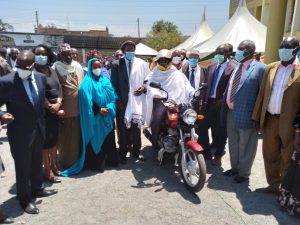
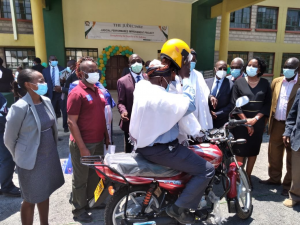
2. Increasing the Capacity of Human Rights Defenders for the Protection and Promotion of Children Best Interest in the Kenya’s Juvenile System in Nairobi, Kisumu and Kericho supported by EU in partnership with CESVI
Project Brief:
Under this project, LRF’s work is anchored in three pillars i.e. Capacity Building for justice actors, service provision (legal Aid provision to children) and advocacy work on issues affecting juvenile justice in target counties as well as nationally. This is achieved through training of Court Users Committees and juvenile justice actors, supporting coordination forums (Children Court Users Committees), providing legal aid to children through paralegal awareness sessions and free legal representation, Victim Offender Mediation (VOM), radio talk shows, establishing and supporting juvenile justice working groups for civil societies. Further, the program supports petitions from the target communities to the respective policy arms. The program mainstreams gender, Persons with Disability to ensure that targeted boys and girls, and especially those with special needs benefit from the various interventions.
Project Objective: To strengthen Alternative Care System and Awareness Grounded in the Best Interests and Rights of Children Separated from their Families
Project Highlight:
The project has successfully mobilized and trained fifty (50) Human Right Defenders in Kisumu and Nairobi on alternative care for children in contact with the law.
3. Action to adopt, strengthen and promote the protection of survivors of sexual and gender-based violence among women and girls, and enhancement of their ability to access justice through sound and enforceable policies and legislations to reduce their vulnerability supported by Trocaire
Project Brief: The Project seeks to protect the rights of women and girls in the target areas of Mukuru Kwa Njenga, Kangemi, Naivasha slums who form a critical constituency of LRF’s programming. Indeed, LRF is in the fore of addressing challenges facing women and girls among other vulnerable groups with the aim of enhancing access to justice. LRF strategy defines women and girls as special interest groups whose legal rights, protection from abuse, stigma and discrimination and access to services must be mainstreamed in all its programming and interaction with partners and stakeholders.
Project Objective: To ring-fence the dignity and protection of women and girls likely faced with SGBV in Nairobi’s slums of Kangemi and Mukuru, through provision of legal aid, strengthening community SGBV’s prevention mechanisms and facilitating referral of survivors for psychosocial support. We also seek to consolidate gains made with regards to the Nakuru County Women and Girls focused (Trocaire - UNTF) Project to strengthen their protection and promote access to justice through policy advocacy at local and national level.
Project Highlight:
The project supported survivors of gender and sexual driven violence at the onset of COVID-19 with dignity kitties, food stuff and house items in Nakuru and Nairobi
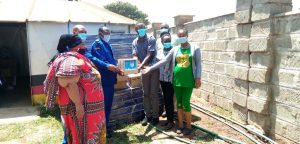
4. Prisons, Communities and Legal Aid Project
Project Brief: The project seeks to promote access to legal aid for pretrial detainees and local communities in Nairobi, Mombasa and Kisumu Counties, while engaging national and county duty bearers on policy and legislative development to facilitate and amiable operational environment, the expected end being:
- a) Informed and prepared pre-trial detainees, litigants and/ or local communities who can adequately engage the justice system;
- b) Increased number of pre-trial detainees (who are indigent persons) receiving legal aid and assistance;
- c) Strengthened link between community justice systems and ADR mechanisms with the formal justice system providing a seamless design of justice pathways for indigent persons in detention and local communities; and
- d) Existence of a supporting and sustainable policy and legislative legal aid and assistance framework in Kenya
Project Objective: To enhance access to justice, by promoting access to legal aid and assistance for pre-trial detainees and local communities in focus counties, while engaging national and county duty bearers on policy and legislative development to facilitate and amiable operational environment.
Project Highlight:
The project has been instrumental in conceptualization and actualization of Haki FM Oasis of Justice
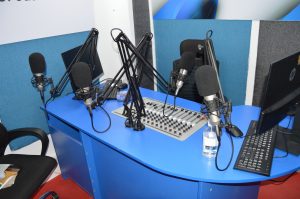
5. Human rights and Criminal Justice System transformation project supported by Open Society Policy Center (OSPC)
Project Brief: This project seeks to improve human rights conditions in places of detention as well advocating for alternatives to incarceration of petty offender who are charged of state regulated offenses in Kenya. The counties of focus in this project are Meru and Kisii counties.
Project Objective: To contribute towards a human rights culture through use of alternative to incarceration and deprivation of liberty as a corrective strategy to dealing with state regulated and petty offenses.
Project Highlight:
Besides documenting numbers, types and scope of state regulated offences as created by both county and national laws, the project has been instrumental in creating a safe space for rights holders and duty bearers to have a candid conversation on balancing government interest to collect revenue through legislation of draconian laws and observance of rule of law. This has been achieved through establishment of communities of practice.
6. Operationalizing legal aid Act 2016 through paralegalism, practice and policy advocacy (PLEAD call 3) supported by EU UNDP – Amkeni Wakenya
Project Brief: Under this project enhances access to justice for the poor and marginalized by the promotion of legal aid and assistance for pre-trial detainees and local communities in Nairobi county. The project also seeks to strengthen traditional court processes, pilot and replicate innovative litigation processes, as well include non-traditional dispute handling approaches. The project uses the paralegal approach to increase legal awareness through simplified sharing of legal information.
The primary project sites are Lang’ata, Starehe and Makadara Sub Counties in Nairobi County targeting Pre-trial detainees, local communities (local population including elders, clergy and chiefs), police and prison officers in Nairobi prisons. At the national policymaking level, it engages National Council Administration Justice, Department of Justice, Law Society Kenya and National Legal Aid S. The project emphasizes on mutual interactions and engagements with prosecutors, probation officers and judicial officers in Nairobi County.
Project Objective: To enhance access to justice, through promoting access to legal aid and assistance for pre-trial detainees and local communities in Nairobi County, while engaging national and county duty bearers on policy and legislative development.
Project Highlight
The project has been instrumental in strengthening the functionality of community justice centers in Lang’ata and Eastleigh, conceptualization and publication of the quarterly human rights and legal aid magazine, and conceptualization and publication of the status of legal aid in Nairobi.
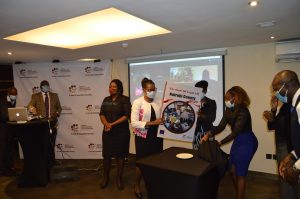
7. Land environment Olkaria community empowerment supported by DFID in partnership with International Lawyers’ Project (ILP)
Project Brief: This project seeks to strengthen the capacity of local communities in - Kitet, Narasha and Maimahiu in Narok County to deal with the challenges facing the residences with their rights violations, land issues and conflict/dispute resolutions. `
Project objective: To empower Maasai communities impacted by green energy investments to negotiate for their rights
Project Highlight:
The project has been instrumental in conducting a series of radio talk shows to build the legal capacity amongst the Maasai community in Olkaria with an aim of enabling the community to engage with the government and investors from an informed perspective.
8. Stemming radicalization for safe penal facilities/Penal institutions safe from violent extremism supported by Global Community Engagement and Resilience Fund (GCERF)
Project Brief: LRF contributes interventions that make penal institutions less vulnerable to the influencers of violent extremism. Specifically: a) Diminish opportunities for radicalization to VE of prisoners, prison officers and civilians: and b) Enhanced capacity of law enforcement to improve access to justice and prevent violent extremism. The project seeks to reform policy and laws in penal institutions to reduce the inadequacy to address violent extremism, including revamping the capacity of law enforcement agencies to understand and navigate the intricate continuum of violent extremism.
Project Objectives: To contribute interventions that make “penal institutions less vulnerable to the influencers of violent extremism.” Specifically:
- a) Diminish opportunities for radicalization to VE of prisoners, prison officers and civilians; and,
- b) Enhanced capacity of law enforcement to improve access to justice and prevent violent extremism
Project Highlight:
Besides training of close to 5000 prisoners and 300 prisoners Nairobi and Mombasa Counties on Prevention and Countering Violent Extremism, the project was instrumental in development of a first of its kind penal institutions anti-radicalization strategy and a report highlighting the impacts of National Strategy to CVE since its inception.
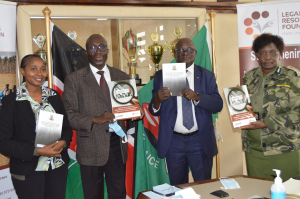
COVID 19 – Response Projects
9. Enhancing access to legal Aid for the marginalized in Nakuru; a focus on detention facilities (Call 6) supported by UNDP
Project Brief: The project seeks to enhance access to justice by providing access to Legal Aid for vulnerable persons in Nakuru county in the context of COVID-19.
Project Objective: Improved access to legal aid for persons deprived of liberty in Children Remand Homes, Police Stations and Prison
Increased capacity of prisons to respond to access to justice needs of Prisoners in the context of COVID-19.
Project Highlight:
The project has successfully strengthened the functionality of Penal Institution’s Human Rights Audit Committee the end goal being protection and promotion of fundamental freedoms and rights of the most vulnerable in detention, including: children, women, elderly, intersex, persons with mental illness and persons with chronic illnesses.
10. C-19 Grassroots Justice Project supported by Global Fund for Human Rights (GFHR) – Grassroots Justice Funds through the NAMATI Network.
Project Brief: The project seeks to enhance access to justice for pre - trial detainees and children in conflict with the law through innovations occasioned by COVID 19 pandemic. The counties of focus are Nairobi, Nakuru, Kericho, Baringo and Kisumu.
Project Objective: To enhance access to justice through e-court and learning while safeguarding and mitigating COVID – 19 effects.
Project Highlight:
The project has ensured the wheels of justice continues to roll the advent of COVID-19 notwithstanding through provision of video conferencing infrastructure and internet to support virtual courts.
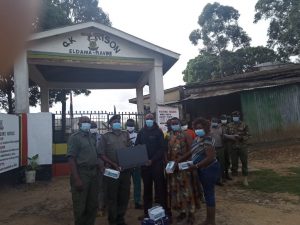
Host Organization to:
11. Paralegal Society of Kenya (PSK) - Implementing the Legal Aid Act 2016, Strengthening paralegalism supported by EU UNDP – Amkeni Wakenya
Project Brief: The organization formerly existed as the Paralegal Support Network – PASUNE. PSK role is to keep the paralegal movement vibrant and responsive to the dynamics in the sector by building capacities of individual paralegals, paralegal organizations, and members of the public. At the individual level, the paralegal will have the information of what is required to remain relevant in the changing political, economic, legal and social context. This will help them to realign their strategies of engagement in the community and expand their reach. PSK is a key contributor to advancement of paralegal services through its standard and comprehensive training offered through HAKI Institute. PSK collaborates with the National Legal Aid Service (NLAS) towards the accreditation of paralegals in Kenya.
Project Objective: To enhance the efficiency of paralegals in Kenya.
Project Highlight:
The project has successfully registered Paralegal Society of Kenya as legal entity/ coalition for paralegals across the country
Host Organization to:
12. Voices for Climate Action (VCA) Programme supported by HIVOS
Project Brief: The project seeks to address thinning rural livelihoods occasioned by the trident of weak systems of community resilience, climate change blind-policy development and implementation, besides blatant disregard by the different state agencies’ action causing and sustaining human and ecological devastation in the wake of climate variability to which there is growing awareness. The project will adopt a vertical approach, whereof, communities susceptible to conflicts on account of shared ecosystems in Mombasa/Tana River; Nairobi/Kajiado; and Kakamega/Siaya will be empowered to negotiate for climate change friendly policies at the County and National Levels through a multifaceted approach that shall encompass:
- Deliberate participation of vulnerable and vulnerable demographics in development of climate change mitigation frameworks;
- Promotion of evidence driven decision making in regards to local communities’ preparedness to climate change unpredictability; and,
- Building of climate change movement that can plug into the often – shifting national policies, reforms of industry and development of technology.
The project is a consortium of three (3) organizations namely: Legal Resources Foundation Trust (LRF), UJAMAA, and ECONEWS.
Objective: To expand policy, finance and advocacy space for communities most affected by extreme climate through strong political and community agency.